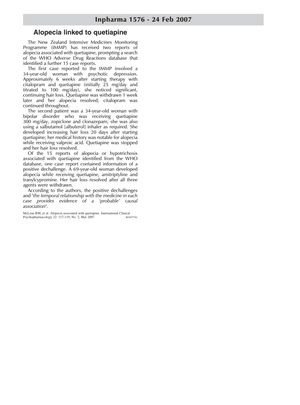Alopecia Linked to Quetiapine
February 2007
in “
Inpharma weekly
”

TLDR Quetiapine may cause hair loss.
The New Zealand Intensive Medicines Monitoring Programme (IMMP) reported two cases of alopecia linked to quetiapine, prompting a search of the WHO Adverse Drug Reactions database, which identified 15 additional cases. In the first case, a 34-year-old woman with psychotic depression experienced significant hair loss 6 weeks after starting quetiapine, which resolved after discontinuation. The second case involved a 34-year-old woman with bipolar disorder who developed hair loss 20 days after starting quetiapine, which also resolved after stopping the medication. One additional case from the WHO database showed a positive dechallenge in a 69-year-old woman. The authors concluded that the temporal relationship and positive dechallenges provide evidence of a probable causal association between quetiapine and alopecia.



